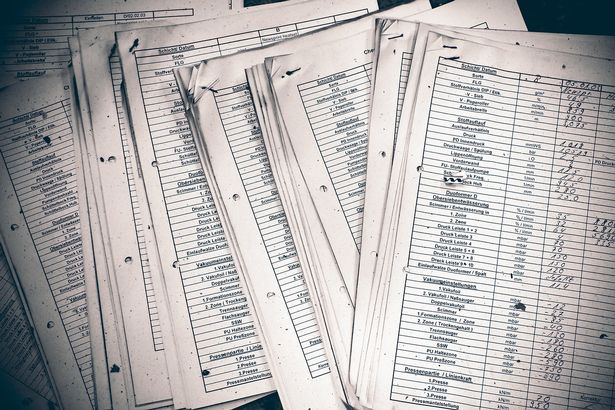There are 35 unclaimed estates left behind by people who were either born in Plymouth or died here – and someone needs to claim the cash.
Details of more 30 lost fortunes in Plymouth have been released by the Government in the hope that distant relatives step forward and claim the estates.
A total of 35 people who either died in Plymouth or were originally from the city died without any next of kin laying claim to their belongings or property.
If nobody steps forward, they are eventually handed over to the Crown permanently.
The latest official list of unclaimed estates – which was updated yesterday – reveals thousands across the country.
Anyone with the same surname as someone on the list can make a claim.
The full list contains more information – such as marital status, spouses, aliases and maiden names – all of which can help you identify a long-lost deceased relative.
Some of those on the Plymouth list died had been in care homes, while others died at Derriford Hospital. Many of the deaths date back many years.
The Government is currently taking care of the estates because the deceased passed away without making a will or with no next of kin.
The money and property in the estates will revert to the Crown permanently if they remain unidentified.
According to Finders International – a specialist probate genealogist team – family members and heirs have just 12 years to clim an estate once it has been reported unclaimed to the CrownIfnk that you might be the rightful heir to one of the estates listed you can find out how to make a claim for that estate here.
The list has seen a sharp increase in numbers over the past few years because Government cuts mean there is no search for a will before an unclaimed estate is added to the list.

The list of names linked to Plymouth
| Forename | Surname | Place of Birth | Place of Death |
| Norma Glynne | Baker | Liverpool | Plymouth |
| Una Pearl | Cartlidge | Plymouth | |
| Frank William Crane | Clark | Isleworth, Middlesex | Plymouth |
| John Alfred | Clayton | Aldershot, Hampshire | Plymouth |
| Arthur John Cyril | Clifford | England | Plymouth |
| Simon | Cohen | Plymouth | |
| Douglas John | Cutland | St Austell | Tavistock |
| Robert Basil | Davey | London | Plymouth |
| Peter John | Davies | Plymouth | |
| Doreen Valerie | Dawes | Abbots Langley, Hertfordshire | Plymouth |
| Thomas | Fraser | Ballyhooley, Ireland | Plymouth |
| Elizabeth Ann | Hall | Bexley, Kent | Plymouth |
| Michael | Halloran | Lettermore, Co Galway, Ireland | Plymouth |
| Ernest | Hicks | Cornwall | Plymouth |
| Marie Louise | Hiscock | Tavistock | |
| William | Holden | Plymouth | |
| Peter Charles | Hunt | Singapore | Plymouth |
| Alison Ruth | Iles | Plymouth | Edgbaston, West Midlands |
| John | Jackson | England | Plymouth |
| Margo | Kern | Plymouth | |
| Gwendoline Ruth | Lear | Plymouth | |
| Janet | Little | Plymouth | Burgess Hill, West Sussex |
| Wilfred Oswald | Lowe | Plymouth | Plymouth |
| Gladys Lillian | Marsden | Plymouth | Plymouth |
| Gordon | Morris | Plymouth | |
| Lorraine Ernestine | Phillips | Plymouth | Plymouth |
| Allan Harry Stephen | Pickering | Devon | Plymouth |
| Edward Peter | Teague | Plymouth | New Milton, Hampshire |
| Irene | Temple | Plymouth | |
| Helja Gemina | Thomas | Finland | Plymouth |
| Chun | Torode | China | Plymouth |
| Marjorie Edna | Vindevogel | Plymouth | |
| Anthony Edward | Walker | Plymouth | Plymouth |
| John | Wilson | Scotland | Plymouth |
| William | Wilson | Plymouth |
How to make a claim
Check your entitlement
If someone dies without leaving a valid or effective will (intestate) the following are entitled to the estate in the order shown below:
- husband, wife or civil partner
- children, grandchildren, great grandchildren and so on
- mother or father
- brothers or sisters who share both the same mother and father, or their children (nieces and nephews)
- half brothers or sisters or their children (nieces and nephews of the half blood or their children). ‘Half ’ means they share only one parent with the deceased
- grandparents
- uncles and aunts or their children (first cousins or their descendants)
- half uncles and aunts or their children (first cousins of the half blood or their children). ‘Half’ means they only share one grandparent with the deceased, not both
If you are, for example, a first cousin of the deceased, you would only be entitled to share in the estate if there are no relatives above you in the order of entitlement, for example, a niece or nephew.
Make a claim
If an entitled relative survived the deceased but has since died, that relative’s personal representative (the person legally entitled to deal with their estate) must make a claim to the deceased person’s estate.
If you believe you are entitled to claim an estate, send a family tree which shows how you are related to the person who has died, and include the dates of birth, marriage and death of all those on the tree.
If it appears that you may be entitled to claim the estate, you will then be asked to supply documentary evidence that proves your entitlement.
This article has been posted in plymouthherald
